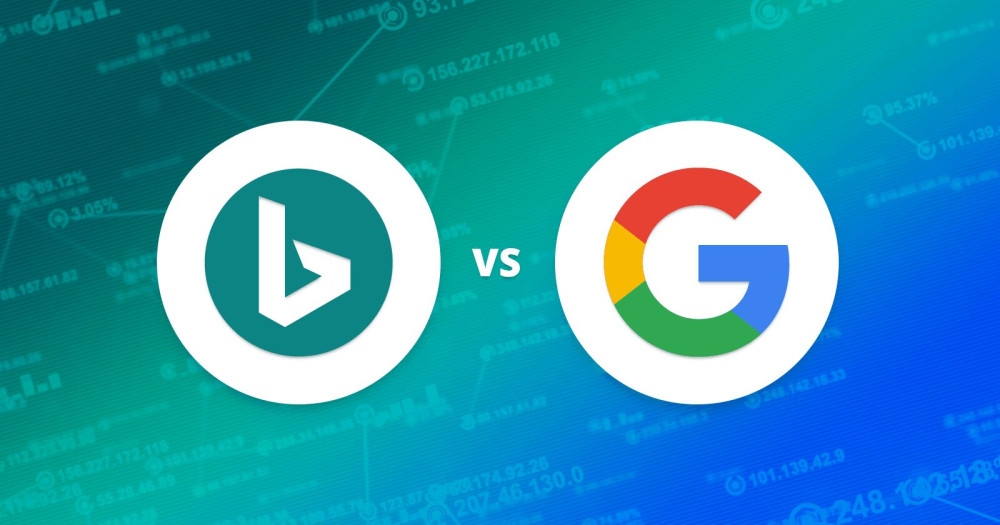A Brief History of Bing and Google
Google vs Bing, the clash of these two search giants, is a saga that traces back to the early days of the internet. Google was launched in 1998 by Larry Page and Sergey Brin, quickly revolutionizing web search with its PageRank algorithm. Google's mission to "organize the world's information and make it universally accessible and useful" led to its dominance in the search engine market. Over the years, Google expanded its services to include email, cloud storage, maps, and more, cementing its place as a tech behemoth.
In contrast, Bing, Microsoft's search engine, was officially launched in 2009, succeeding MSN Search and Windows Live Search. Microsoft's entry into the search market was an effort to compete with Google's growing influence. Bing aimed to provide a more visual and user-friendly search experience, incorporating features like image and video previews directly in search results. Despite being the underdog, Bing consistently innovated and improved its search algorithms, striving to capture a more significant market share in the Google vs Bing rivalry.
Bing vs Google Market Share in 2024
In 2024, the Google vs Bing competition continues to shape the search engine landscape, with both companies vying for user attention and market share. Google, retaining its dominant position, commands a substantial portion of the global search engine market. Its market share is bolstered by its integration with the Android operating system and Chrome browser, making Google Search the default for millions of users worldwide. Furthermore, Google's continuous advancements in artificial intelligence and machine learning ensure its search results remain highly relevant and accurate.
On the other hand, Bing has made significant strides in 2024, especially in regions where Microsoft products are prevalent. Bing's integration with Windows OS and Edge browser has helped it capture a loyal user base. Additionally, Bing's partnership with Yahoo! and AOL expands its reach, contributing to its growing market share. Bing's focus on niche areas, like travel and image search, has also attracted users seeking specialized information. While Google remains the dominant player, Bing's steady growth highlights the evolving dynamics of the Google vs Bing market share battle.
Differences Between Bing and Google
When comparing Google vs Bing, several key differences become apparent, influencing user preferences and search experiences. One of the most noticeable distinctions is the user interface. Google offers a clean and straightforward design, focusing on simplicity and speed. Its homepage is famously minimalistic, featuring just the search bar and logo. Bing, however, presents a more visually appealing interface with daily changing background images, providing a dynamic and engaging user experience.
Another difference lies in the way search results are displayed. Google emphasizes text-based results with rich snippets and structured data, enhancing the relevance and readability of information. Conversely, Bing integrates more visual content directly into its search results, including larger images and video previews, catering to users who prefer a more graphical approach. Additionally, Bing's social media integration, especially with platforms like LinkedIn and Facebook, offers users insights influenced by their social connections, a feature less emphasized by Google.
The algorithms powering Google vs Bing searches also exhibit distinct characteristics. Google's algorithms are heavily reliant on AI and machine learning, continuously evolving to understand user intent better and provide personalized results. Bing, while also leveraging AI, places more emphasis on context and user feedback, often delivering results that are more conservative but reliable. These differences in approach and technology contribute to the unique strengths and weaknesses of each search engine, shaping the ongoing competition in the Google vs Bing landscape.
Bing vs Google: Differences in Ranking Factors
Understanding the ranking factors in the Google vs Bing comparison reveals how each search engine prioritizes different elements to determine search result rankings. Google's ranking factors are famously complex and multifaceted, incorporating over 200 signals. Key factors include content relevance, quality backlinks, mobile-friendliness, page speed, and user engagement metrics like click-through rates and bounce rates. Google's sophisticated algorithms, powered by machine learning models like BERT, strive to interpret search intent and context, ensuring that users receive the most relevant results.
Bing, while also utilizing a variety of ranking factors, places distinct emphasis on specific elements compared to Google. For instance, Bing values keyword usage more heavily, rewarding precise keyword matching in titles and content. Additionally, Bing gives greater importance to social signals, considering the impact of social media shares and interactions on content visibility. Bing's algorithm also favors multimedia content, such as images and videos, which can enhance the ranking of pages featuring rich media.
Another notable difference in the Google vs Bing ranking factors is the treatment of backlinks. While both search engines recognize the importance of quality backlinks, Google's algorithm is more adept at assessing the authority and relevance of linking domains. Bing, however, places higher value on the quantity of backlinks, provided they come from reputable sources. Understanding these nuances helps webmasters optimize their content for each platform, acknowledging the distinct priorities and methodologies of Google vs Bing in the search engine arena.


